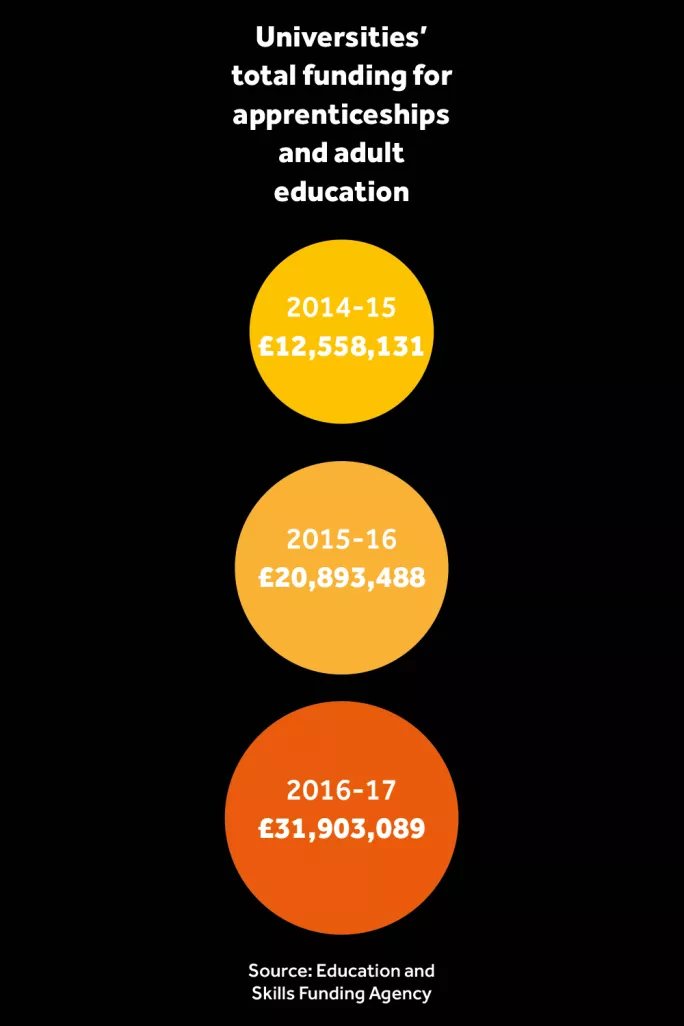From lecture halls to workshops: universities make their move into FE

The fortunes of the higher and further education sectors have, in recent years, seemed to be heading in opposite directions.
A 2015 report by the Policy Exchange thinktank pointed out that, since 2009-10, overall university income had increased by 26 per cent, while the adult skills budget had been cut by 24 per cent.
Universities were, it added, “sitting on significant financial reserves, and public spending is currently skewed too much towards higher education to the detriment of further education”.
In the subsequent two years, however, Tes has uncovered a surprising shift in the behaviour of universities: higher education institutions are expanding into FE. In just two years, university income from apprenticeships, traineeships and the adult education budget has more than doubled, from £12.6 million in 2014-15 to £31.9 million in 2016-17. In the same period, the number of universities in receipt of funding for FE provision has almost trebled, from 21 to 62.
With more and more universities looking to capitalise on the introduction of the apprenticeship levy by offering work-based qualifications at degree level, the trend is set to continue. Just last month, Middlesex University launched its new five-year strategy, promoting itself as the “university for skills”, and pledging to develop new programmes, including apprenticeships.
And the battle is set to get fiercer: the government last week announced it was launching a review of higher-level technical education - the “post-secondary, sub-tertiary qualifications” at level 4 and 5, which reside in the contested space between HE and FE. Universities, it seems, are switching focus from the lecture hall to the workshop.
This shift can partly be attributed to the growth in higher and degree apprenticeships. According to the latest provisional government data, the number of higher-level apprenticeships has increased tenfold over the past six years - from 5,700 in 2011-12 to 61,000 in 2016-17.
But Tes understands that universities are also beginning to offer more level 3 provision, and so-called “year-zero” courses - preparation programmes for degrees.
‘Mixed results’
Kirsti Lord, deputy chief executive of members’ services for the Association of Colleges, says that universities are increasingly moving into markets that had traditionally been held by further education providers “with very mixed results”.
While she says that there are some “excellent collaborations between higher education institutions and colleges”, these are “becoming scarce as competition increases”.
“Too many young people and adults are being recruited on to higher education courses who simply cannot cope and drop out carrying a high level of debt with no qualification,” she adds.
Lord says that the development of more higher-level apprenticeships, stimulated by the government’s target of creating 3 million apprenticeship starts by 2020, has offered the opportunity for increased collaboration between FE and HE.
“In many cases, universities have chosen to set up apprenticeship delivery in isolation without the valuable employer relationships and the delivery expertise that FE colleges can offer,” says Lord.
“We believe this is a missed opportunity to offer apprentices and employers best value for money and a well-supported progression route from level 2 to level 6.”
More universities, it seems, are deciding to go it alone in the apprenticeships market. In the past year, the number of universities with membership of the Association of Employment and Learning Providers - the body for training providers - has grown from five to 14.
Chief executive Mark Dawe says that universities have seen the levy as an opportunity to widen their offer and improve their employer engagement, with nearly 100 now registered to deliver apprenticeships.
Dawe is cautiously supportive of this trend. “Providing degree apprenticeships are genuinely work-based and meeting the required new standards, we support the expansion of apprenticeships to higher levels and the widening of the provider base. However, we don’t want the growth in higher- and degree-level apprenticeships to be at the expense of the vital lower-level provision, nor to damage the social mobility agenda.”
Expanding provision
Of the higher education institutions in receipt of Education and Skills Funding Agency funding in 2016-17, the University of Derby had the largest provision, receiving £3.8 million. Jane Lowe, head of apprenticeships at the university, says this was largely due to its merger with Leek College in 2012 to create Buxton and Leek College, with which it shares its ESFA contract.
However, the university is expanding its provision of higher apprenticeships in areas such as mineral technology, with five new degree apprenticeships introduced in September. Owning an FE college allows the university to establish progression routes into degree-level study, says Lowe, and means its offer to employers can involve provision at all levels of technical and vocational education.
Another prominent higher education institution in the field of FE is Coventry University. This summer its latest venture, CU London, started offering full- and part-time programmes in East London - less than a mile as the crow flies from Barking and Dagenham College, which also offers degrees.
However, a spokeswoman for the university says there is “little similarity” with the courses on offer at the college, with which it has a close relationship. “To reduce competition with the college, we do not offer access programmes as we do in our other campuses, as the college already offers these - we are working with the college to develop progression routes into our provision, whether in London, Coventry or Scarborough,” she adds.
But the university also offers some ESFA-funded activity in order to “reach out and widen participation”, and views apprenticeships at level 4 and above as “an important component of its offer [that] builds upon its rich heritage of its links to industry”.
Ian Pretty, chief executive of the Collab Group of colleges, believes there is “a strong case for collaboration between FE and HE” at levels 4 and 5, not least through the government’s proposed institutes of technology. A Department for Education policy document published in September confirmed that the institutes should be joint projects between at least one FE institution or private provider and a higher education institution.
However, Pretty adds that Collab members have voiced concerns about a small number of universities actively moving into the delivery of level 3 (A-level equivalent) courses. “We need to ensure that post-16 education is delivered by those who best understand how to shape and deliver curriculum,” he says. “We believe that colleges are best placed to deliver level 1, 2 and 3 educational needs.”
On this issue, the AoC is in agreement, Lord says. “The AoC believes that further education colleges are best placed to deliver courses that support progression into higher study, with strong academic and pastoral support offered to students who have often been out of education for a while.
“Universities often deliver these courses with larger group sizes, fewer taught hours, less support available, and refer students without the appropriate maths and English qualifications back to FE colleges for part-time resit programmes, where a full offer could be provided by the college.”

You need a Tes subscription to read this article
Subscribe now to read this article and get other subscriber-only content:
- Unlimited access to all Tes magazine content
- Exclusive subscriber-only stories
- Award-winning email newsletters
Already a subscriber? Log in
You need a subscription to read this article
Subscribe now to read this article and get other subscriber-only content, including:
- Unlimited access to all Tes magazine content
- Exclusive subscriber-only stories
- Award-winning email newsletters